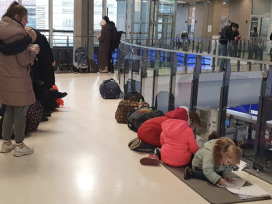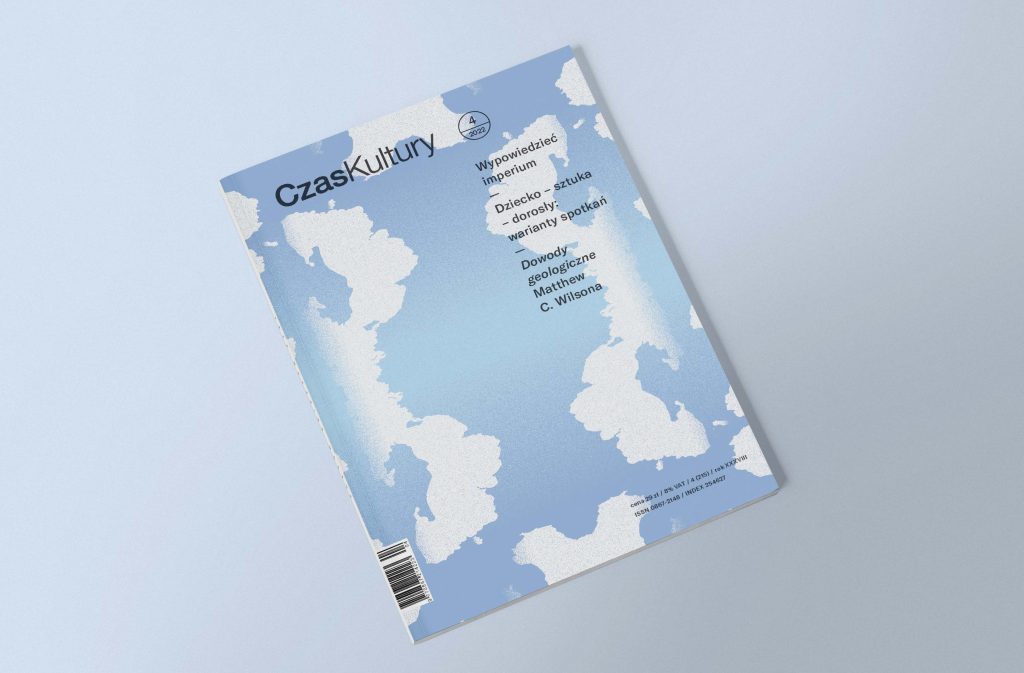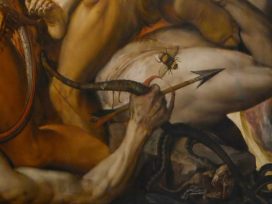
'It’s important to be open'
A Knowledgeable Youth podcast
Remaining in a new country or returning home? The Knowledgeable Youth podcast delves into the complex decision-making refugees face when migrating, together with researcher Olena Yermakova.
Why the West worries more about cancel culture than cultural annihilation; what orientalism means to eastern Europeans; and how Polish children’s literature is changing with the troubled times.
In the Poznań-based journal Czas Kultury, Ukrainian novelist Victoria Amelina argues that western commentators are wrong to ask what to do about Russian culture when Ukraine is facing another Executed Renaissance – the term for the Soviet purge of Ukrainian writers and intellectuals in the 1930s.
Take for example the stories of ballerina Olga Smirnova or propagandist Marina Ovsyannikova – both embraced by the West after speaking out against the war. Compare that with the fate of Ukrainian artists, writers and journalists who have either already been killed by Russia (Artem Datsyshyn, Oleksandra Kuvshynowa), or are still risking their lives on the front and in besieged cities (Oleg Sentsov, Artem Chekh, Artem Chapaye, Serhiy Zhadan).
From Amelina’s perspective, the question is not whether Russian culture should be ‘cancelled’, but whether Ukrainian culture will once again be annihilated by an imperial aggressor. (Read the article in English in Eurozine.)

Russia’s neo-imperialist war is a product of processes that can be traced back to the mid-nineties, and more recently to the doctrine of the ‘Russian world’, writes Belarusian author and translator Ihar Babkou. Officially adopted in the 21st century, this idea governs the state’s efforts to upend the global balance of power, ‘to allow Russia to enter the brave new world in which it too will “have rights”. The right to wage war. The right to lie. The right to kill and imprison dissenters. The right to cynically ignore public opinion.’
Almost a decade after the annexation of Crimea, the West has yet to produce a meaningful analysis of Russia’s imperialist mindset, Babkou argues. For him, western critical theory simply lacks the language to do so. The eastern European borderland, on the other hand, has been speaking about the topic for at least two centuries: from Adam Mickiewicz, through Janka Kupała, to Zianon Pazniak.
More recently, Ukrainians have been applying postcolonial theory to the former Eastern Bloc. Babkou contrasts this with Russian intellectuals’ seeming inability to grasp the concept. When Edward Said’s Orientalism was published in Russian in 2006, the publisher praised Said as Russia’s ally against the West, rather than acknowledging him as a critic of empire in general.
But even a well-developed critical apparatus does not necessarily offer the full picture. Babkou recalls academic analyses of the 2020–2021 Belarusian protests, which correctly identified the nature of the failed revolution (both feminist and liberal, heroic and misguided) and the reasons for its failure (lacking a clear program, spectacular but aimless), but failed to offer any practical, forward-thinking conclusion for the people involved. If it failed, then what was it all for? (Read the article in English in Eurozine.)
With war, unrest and migration increasingly entering daily life in Poland, feminist critic and literary scholar Magdalena Bednarek explores how children’s literature helps young people understand and deal with grown-up problems. Looking at books and stories published in Poland between 2011 and 2022, she notes how their character changes with the times.
Older publications, especially those predating the 2015 European refugee crisis, tend to be more didactic. They introduce simplified information and promote specific attitudes (empathetic, pro-migrant). As migration issues became more immediate, however, another type of text gained prevalence: now the child and parent were meant to read, react to, and reflect on the story together. The authors surrendered some of their authority to make space for what Bednarek calls ‘community reading’:
‘Such reading is cultivated at home, in the micro-community, to feel that one belongs to a larger whole … so that children can learn that the fear and anger they feel when faced with stories of people fleeing from war, famine, or persecution are not childish, but human – and shared.’
Children’s literature could once be considered adults’ projection of what childhood should be like, but constructed realities are becoming impossible in the face of war and climate migration, writes literary scholar and editor Marta Kowerko-Urbańczyk. Analysing European picture-books on migration published between 2016 and 2019, she notes that they appear to be expressions of ‘a spreading anxiety, which belongs to the adults but also infects children’.
In her 2012 book Depression: A Public Feeling (2012), Ann Cvetovich argues that political sadness should be accepted and expressed. Picture-books on migration fill that role well, writes Kowerko-Urbańczyk: they allow authors and readers to come face to face with suppressed emotions, to make peace with them. In such readings, ‘the point is not for the author . . . or the adult reader to explain to the child the intricacies of migration, but to engage in the topic together, to explore it in multiple variants’.
Published 10 January 2023
Original in English
First published by Eurozine
Contributed by Czas Kultury © Eurozine
PDF/PRINTSubscribe to know what’s worth thinking about.

Remaining in a new country or returning home? The Knowledgeable Youth podcast delves into the complex decision-making refugees face when migrating, together with researcher Olena Yermakova.

The difference between knowing from distance that war is being waged and living that reality couldn’t be more extreme. But can awareness of multiple repercussions turn protective disassociation from violence into active solidarity? ‘The Most Documented War’ symposium in Lviv, Ukraine, provides valuable pointers regarding engagement and responsibility.